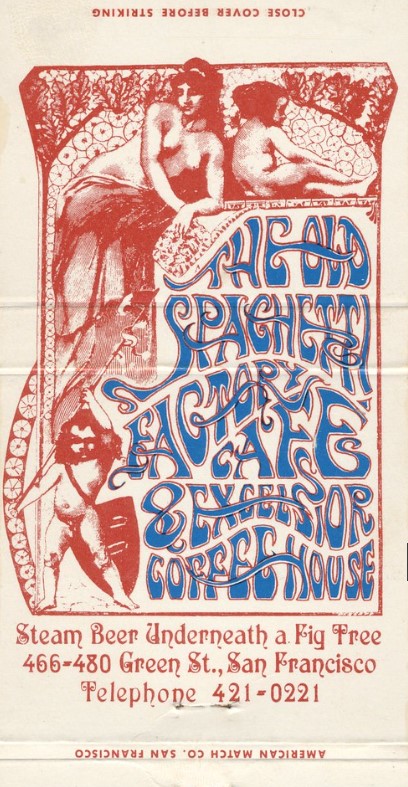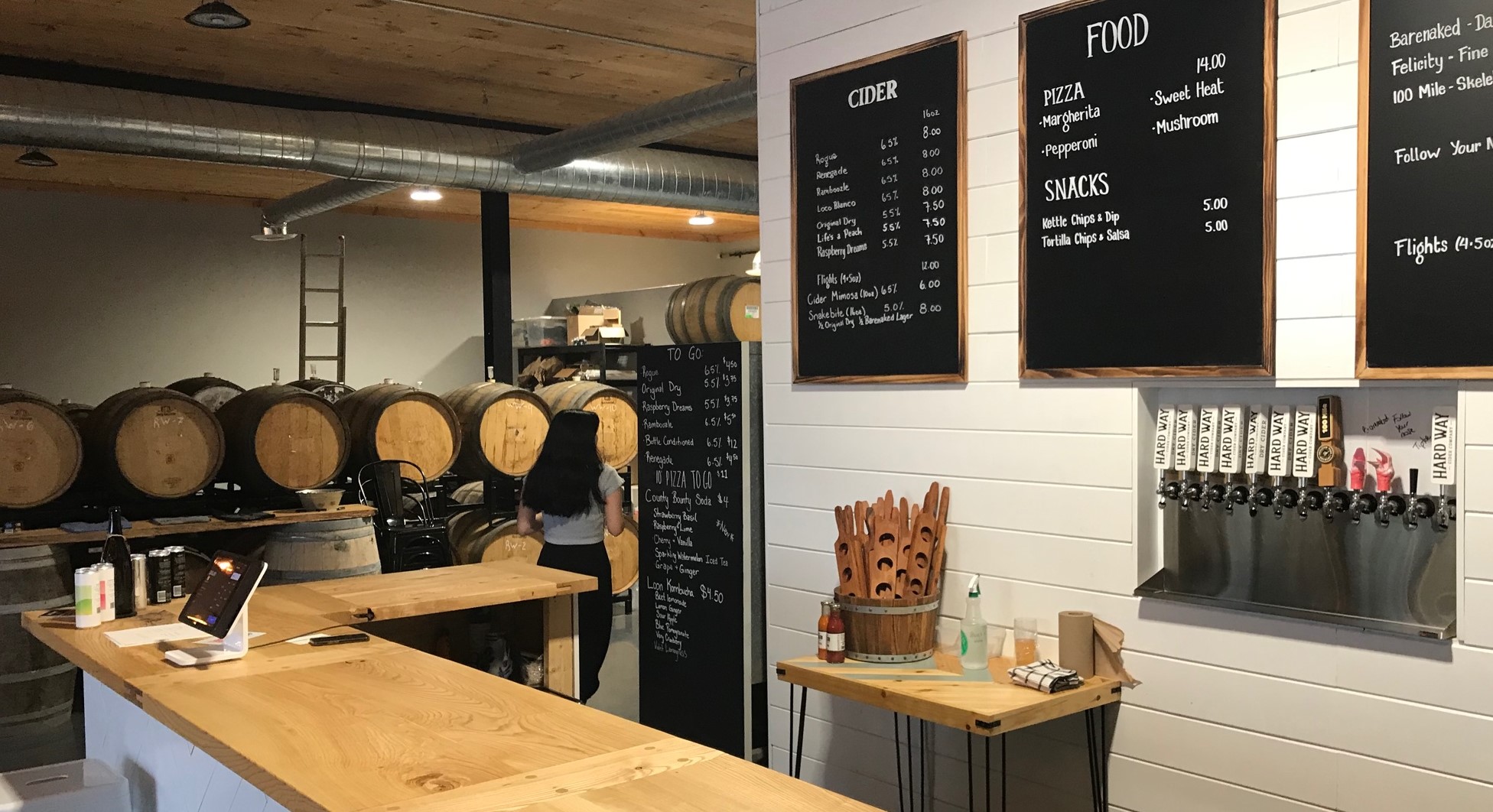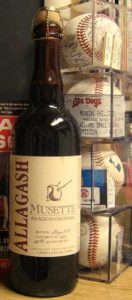Well, so this is August. And what have I done? I had old pals over, one not seen since about 1989, and shoved some Hard Way Cider at them. Lovely stuff. And I actually finished a briefish if tiny fonted biography of pretty boy Johnny Milton which was interesting even as a reminder of the politics of the 1600s. Forty year old Hons 17th Century Lit flashbacks triggered. Shudders. Have had hard time getting back to the books since my first and only bout of Covid back in April but seem to be back on track, thanks for asking. Next, on to High on the Hog. Also of note, I still have no understanding of cricket whatsoever but apparently the crickets were good this week.
First up, Beth Demmon has another edition of Prohibitchin’ out, this time with a portrait of perry maker Erin Chaparro:
Erin splits her time between her position as a Research Associate Professor at the University of Oregon’s Educational and Community Supports Research Center and working at the tasting room—which is on the farm’s property—on weekends. But before there was Blossom Barn or even pear trees planted, Erin wondered: what type of farm would set them apart? The pair didn’t want to commit to water-intense crops like hops or lavender, but had been introduced to perry a few years prior and loved it. Plus, the state fruit of Oregon is pear, and the perfect pears found in the iconic Harry & David gift baskets are grown in nearby Medford. It was an ideal crop to pay homage to the land, stand out from the myriad nearby wineries, and maintain their commitment to sustainability.
I love perry but, being in Ontario, have little access to the stuff due to the apparent anti-perryist policies of the provincial monopolists. Frankly, pears are the provincial anti-fruit as far as I can tell. Speaking of policies gone mad, Professor Dan Malack helpfully guided me to this indictment of Canada’s very restrictive new alcohol intake recommendations published in Le Devoir. I am going to presume you can parse this bit of French being the clever readers you are:
“Le modèle utilisé a perdu tout contact avec la réalité. […] Et honnêtement, nous croyons que les études sélectionnées ne représentent pas la quantité et la qualité des études sur la question”
Wow. Just wow. As might be obvious from my writings* hereabouts, I can’t fully buy into a public health policy framework that is as adversarial and even perhaps cynical as in this comment: “accusations that opponents of the CCSAs report have alcohol industry connections are especially spurious, although typical, neo-temperance ad hominem responses“… BUT (and I say BUT!!!) that finding on the quality of the CCSA study is astounding. Moi? I will stick to my max 14 drinks a week plan, thanks very much. Alcohol is still not a health drink.
Note: J. R. R. Tolkien discussing his love for beer & pipe smoking. He lived to 81.
Speaking of modernity and extended life spans Euro-folk-wise, I saw this new to me Substack author (writing under the presumed pseudonm Lefineder) and enjoyed this wee essay called “When did people stop being drunk all the time?” which argues that temperance was not the primary moving principle that cause the shift in societal norms – industrialization was:
England transitioned to a low rate of beer consumption toward the end of the 18th century, looking at the more granular data on Malt beer consumption we see that this transition coincided with the timing of the onset of the British industrial revolution (1780-1800s). Society is transformed in several ways, Whereas beer expenditure used to consume 12.5% of people’s salary in 1734 in the 1800s it consume only 1-3%. In the English poll tax of 1379-81 we can see that a total of 2.5% of the medieval workforce is comprised of brewers, in 1841 this is reduced to only 0.3 of the labor force.
This makes tremendous sense. Just as the Black Plagues caused the end of serfdom in Euro-ville, a couple of centuries later industrialization caused the Great Awakenings which led to the benificence of Temperance which was then modified through the blended capitalist / social welfare state to serve as the foundation of the glory of modern western society that we all enjoy today!
Stan had possibly the greatest weekly round up this week, putting at least myself to shame. My tears are spraying the laptop screen even as I type at this very second. I’m not sure why. Probably the deft paragraphing. And probably due to his highlighting of the B+B round up of comments in response to the question why beer seems boring at this point:
Has the excitement gone out of the beer scene, and if so, why? Those are the questions we asked in our most recent newsletter last week. They prompted some interesting responses across all channels. Overall, we’d say those who had an opinion shared our sense that things feel depressed.
What I find most interesting about their post is how it illustrates the need to move “across all channels” now if you want to find good readings – but how it is actually not all that hard once you sign into all the services. You can rethink your priorities like Boak and Bailey have been doing. Check out Don, for example, for voluminous trade positive but extremely well backed views via emailed newsletter. Read Maureen at Mastodon. She’s there. It’s all there. Just a bit more like driving standard than automatic. Folk who bloat on about not leaving Twitter despite its search for the deepest levels of trash seem to me to be like lost spirits wandering an abandoned shopping mall, long devoid of the old good shops, getting the vapours as they run their fingers along the dusty rose tile trim of the stagnant water fountain by the food court, dreaming it was all still like that one interesting bit of Wonder Woman 1984. Err… sorry… it’s all the Milton I’ve been reading doing talking…
Elsewhere amongst the Canadas, Ontario’s small brewers are lobbying against what they consider unfair levels of taxation, a claim that is largely based on our split sovereignty reality where juristiction is divided in a number of ways including between the federal level and the provinces, leading to different taxation regimes (… as well as some bizzarely fifth-rate governments.) Long time friend of the blog (and once upon a time my mini biographer) Troy gave the CBC some quality quotes:
Craft brewers in Ontario face higher taxes than anywhere else in the country, said Troy Burch, senior manager of sales and business development at Great Lakes Brewery in Etobicoke. If no changes are made to the tax structure, he and the Ontario Craft Brewers Association, say they fear more and more of Ontario’s craft breweries will be bought up and merged with foreign buyers. The association says it represents over 100 breweries. “We’re being taxed too much compared to the rest of Canada,” Burch told CBC Toronto. “What we would like to see at the end of the day is just a fairness when it comes to looking across the country.”
Note: there are over 400 craft breweries in Ontario but only 100 or so in the association. Not sure what the other 300 think. Someone has to pay for health care and sins will be taxed.* Interesting to note that the threat is foreign buy-out and not closure. By the way, by way of disclosure the OCB used to sponsor this here blog years ago. $100 a month. Sometimes the cheques came from a PR agency in St.Louis, Missouri. Dunno why.
The Times ran an article on a Bristol pub with a seemingly winning plan for the Sunday lunch crowd that may have been too successful:
A pub in Bristol has been named the hardest restaurant to reserve in the world, with a waiting list stretching more than four years for its Sunday roast dinners. The Bank Tavern on John Street near Castle Park, which was founded in the 19th century, has closed bookings due to an increased demand for its award-winning lunch… the restaurant confirmed it had begun working its way through the backlog and expected the waiting list to reduce soon. It added that bookings for the remaining days of the week were operating as usual.
Boak and Bailey’s notes on the place are in their guide to the city’s pubs including these particular directions: “On an alleyway next to a churchyard along the line of the old city wall this small pub has the feel of a local boozer despite its central location.” Evan wrote a state of the union address on the English pub for VinePair, too, and found hope:
“I think there’s a kind of romanticization of the idea of the pub, which treats it as this sort of unchanging institution that relates back to Merry England,” he says. “Jolly images of medieval times and so on, which is, of course, all utter nonsense.” Instead of being a purely British invention from the halcyon days of “Merry England,” numerous foreign influences have helped to create British pub culture. In recent years, some of the most visible might have their origins in Pakistan, India, and Bangladesh. But a generation or two ago, they predominantly came from the Republic of Ireland — geographically part of the British Isles, but decidedly not part of the United Kingdom.
JRR might disagree on the nonsense suggestions but the overall argument is sound. One sound he might not have appreciated, however, is that of children… in the pub… as investigated by The Guardian this week:
It’s a summer afternoon and most of the punters appear to be young adults and parents in their 50s, plus some teenagers with gen X parents. Boyd’s observation strikes me as true at a cultural level even deeper than the pub: the problem with kids isn’t the kids; it’s the parents. Or rather, it’s what some parents become when their kids are under 10, gripped by a sense that the burden of keeping them contented is astronomically heavy and should be shared by all. Martin Bridge, 52, the owner of the Whippet Inn, a boutique, child-free restaurant in York, says: “Being in the industry 30-odd years – and also out shopping, out in public places – how parents view the responsibility of their children, and how that has changed, is quite mind-blowing. It feels as though the kids are now the responsibility of everybody, all the time.”
Frankly, this cultural angst has always struck me as a bit odd (like perhaps that cold draught felt on a warm day as when the backs turned to us at the Golfers’ Rest... though perhaps space was also being made in a way…) but I live in a jurisdiction with a human rights code that protects folk receiving services from discrimination based on family status… so go figure.
Speaking of innovative tavern type places,  Gary continued his series on Anchor and its legacy with some thoughts about the brewery in the hippie-dippie era of San Franciso in the 1960s which led me to this piece by Gary’s main source, David Burkhart, about the beat poetry era San Fran of the 1950s:
Gary continued his series on Anchor and its legacy with some thoughts about the brewery in the hippie-dippie era of San Franciso in the 1960s which led me to this piece by Gary’s main source, David Burkhart, about the beat poetry era San Fran of the 1950s:
Frederick Walter Kuh moved to San Francisco in 1954, where he became a waiter/bartender at the Purple Onion. Two years later, on October 19, 1956, Kuh and fellow “founding father” James B. Silverman opened the Old Spaghetti Factory Café & Excelsior Coffee House at 478 Green Street, in the former home of the Italian-American Paste [sic] Company. The OSF became San Francisco’s “first camp-decor restaurant,” Fred later told the San Francisco Examiner, “but it wasn’t called camp then.” Early on and counterintuitively, he advertised his bohemian North Beach watering hole and its “Steam Beer Underneath a Fig Tree” in the New Yorker.
That’s a nice sharp photo of the matchbook cover art that the restaurant handed out.
For the double this week, Evan Rail wrote a heart-felt remebrance of Fred Waltman, travelling beer expert, beer guide author and founder of the Pacific Homebrew Club, and included these observations in his thoughts:
The other meaning I’ve taken from Fred’s death is a bit harder to talk about, so I’ll just come right out and say it: The good beer movement is aging, and funerals for beer lovers are going to be a lot more common than they once were. While it might have been the height of youthful exuberance to launch a brewery or a craft beer bar two or three decades ago, plenty of those first- and second-generation brewery and pub owners—and beer fans, to say nothing of beer writers—are now quickly moving toward and past retirement age.
Very true. And this comment from Andreas Krennmair on Mastodon in response to B+B paints an interesting portrait of the man:
…one time I met Fred Waltman, he actually told me why there was always his cap in his beery photos. Many years ago, he got accused by some internet trolls that he hadn’t actually visited all the places he claimed to have visited, and that he had just stolen the photos off the internet. So to prove that the photos were actually his, he started putting his very own cap in the frame. And that‘s how the cap in the photo became his trademark.
We also lost Warren Ford, one of the great tea persons of England as well as David Geary, founder of the Geary Brewing Company of Portland Maine, whose beer I’ve enjoyed for over 30 years, especially their Hampshire Special Ale. The brewery shared the news of his passing on Facebook:
It is with great sadness that we share the passing of David Geary. In 1983, David and Karen Geary founded the 13th U.S. craft brewery, and David’s pioneering spirit and leadership played an integral part in the explosion of the American craft beer revolution. We send our deepest condolences to the Geary family and take this time to celebrate David’s life and legacy.
 And I was surprised to read this week that there are efforts in Ireland to expand barley marketing into being a food crop. I was surprised because, as a Canadian of Scots parents, I have been eating the damn stuff my whole life. But it turns out we only eat 2% of the crop of the StatsCan graph to the right is to be believed. The rest is basically what the US brewing industry is based on. Then I learned that Campbells stopped making their canned Scotch Broth and I am now a little sad. Another hot tid bit of barley news that Matty C shared?
And I was surprised to read this week that there are efforts in Ireland to expand barley marketing into being a food crop. I was surprised because, as a Canadian of Scots parents, I have been eating the damn stuff my whole life. But it turns out we only eat 2% of the crop of the StatsCan graph to the right is to be believed. The rest is basically what the US brewing industry is based on. Then I learned that Campbells stopped making their canned Scotch Broth and I am now a little sad. Another hot tid bit of barley news that Matty C shared?
Interesting article. Barley/Ag in general is where most of the efforts to make beer production sustainable need to be. Farming barley uses a lot of water, and produces around half a kg of carbon for ever kg of malt used in the brewhouse. That’s a lot of CO2!
That is a nutty stat right there. Spin that, ye brewery PR type experts (slash) independent writers (slash) consultants (slash) independent beer award judges!
And finally, Pete Brown shared some very personal thoughts in is emailed newsletter, building on the piece by Mark LaFaro discussed here abouts a month or so ago, as he shared his grief at passing of his own younger brother, Stuart Brown, who died at just 51:
It makes me examine my own drinking very carefully – I drink too much. Many of us in the industry do. This excellent piece in Good Beer Hunting last month makes for uncomfortable reading. It makes me think about the false bravado we have, the way we mutually reassure ourselves that we can’t be abusing alcohol because it’s work and we know what we’re doing, or alcoholics only really do any real damage when they’re on spirits (Stuart killed himself with Henry Weston’s Vintage Cider and cheap white wine, by the way.) But it also reminded me why I argue so hard that there is such a thing as positive drinking. Stuart drank mainly alone, in his flat. He didn’t go to pubs much. He didn’t have many friends. If he’d drunk socially in the gorgeous 17th century pub five minutes from his flat, he might still be here. I’m back now. More hesitant and less confident in what I’m doing, less sure of myself in this strange industry. Let’s see how it goes.
Tough reading such open thoughts. My family member like Stuart was my youngest uncle who recently passed away. He was a bit lucky. He caught himself before an early death but he dealt with the serious burdens he placed in his path for the rest of his life.
As per and as is more and more the case, you can check out the many ways to find good reading about beer and similar stuff via social media and other forms of comms to connect – even including at my new cool Threads presence @agoodbeerblog. Have you checked out Threads as Twitter ex’s itself? (Ex-it? Exeter? No that makes no sense…) They appear to achieved to make social media offer less and less. Brilliant… but I never got IG either. I still prefer the voices on Mastodon, any newer ones noted in bold:
Alan McLeod | A Good Beer Blog (… me…)
Stan Hieronymus | The Man!
Boak & Bailey | The B² experience
Curmudgeon Ale Works | Jonathon is Brewing
Katie Mather | Shiny Biscuit and Corto
David Jesudason | “Desi Pubs” (2023) author
BeoirFest | They say “Let’s Talk Beer”
Ron Pattinson | The RonAlongAThon Himself
Al Reece AKA Velky Al | Fuggled
Jennifer Jordan | US hops historian
Andreas Krennmair | Vienna beer and lager historian
Beer Ladies Podcast | Lisa Grimm and colleagues
The Bar Towel | Toronto’s chat zone for beer lovers
Chicago Beer Society | Folk in Chicago getting social over beer
Jay Brooks | Brookston Beer Bulletin
Joe Stange | Belgian beer expert, beer magazine editor
Cider Bar | Barry makes Kertelreiter cider
Laura Hadland | CAMRA historian and beer writer
Brian Alberts | US beer historian
Jon Abernathy | The Beer Site
Maureen Ogle | US Beer Historian
Lars Garshol | Norwegian Beer Historian and Kveik Hunter
James Beeson | Beeson on Beer
Carla Jean | MAINER!!!
Thandi Guilherme | Beer Ladies Podcast Co-host
Lisa Grimm | Beer Ladies Podcast Co-host
Roy of Quare Swally | Beery ramblings from Northern Ireland
Rob Talksbeer | Podcaster and Youtuber
Anthony Gladman | UK Drinks Writer
Jeff Alworth | Manna Of Beervana
Northwest Beer Guide | Fairly self explanatory… but not NW Latvia…
Evan Rail | Prague based GBH editor, freelance writer, NYT etc.
Todd Alström | 50% of the Alströms
Jacob Berg | Beer talking librarian
Anyone else? And, yes, we also check the blogs, podcasts and newsletters to stay on top of things – including more weekly recommendations from Boak and Bailey every Saturday and Stan at his spot on those Mondays! Get your emailed issue of Episodes of my Pub Life by David Jesudason on many Fridays. And Phil Mellows is at the BritishBeerBreaks. Once a month, Will Hawkes issues his London Beer City newsletter and do sign up for Katie’s now more occassional but always wonderful newsletter, The Gulp, too. Ben’s Beer and Badword is back! And check out the Atlantic Canada Beer Blog‘s weekly roundup. There is new reading at The Glass. Any more? Yes! Check to see the highly recommended Beer Ladies Podcast. And the long standing Beervana podcast . There is the Boys Are From Märzen podcast too and check out the travel vids at Ontario’s own A Quick Beer. There is more from DaftAboutCraft‘s podcast, too. All About Beer has introduced a podcast. There’s also The Perfect Pour. Plus follow the venerable Full Pint podcast. And the Craft Beer Channel on Youtube soon celebrating a decade of vids. And remember BeerEdge, too, and The Moon Under Water… if you have $10 a month for this sort of thing… I don’t. Pete Brown’s costs a fifth of that. There was also the Beer O’clock Show but that was gone after a ten year run but returned renewed and here is the link!
*There is still no J-Curve folks even if the harms are statistically marginal with lower levels of intake.











